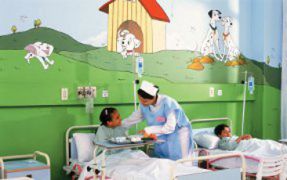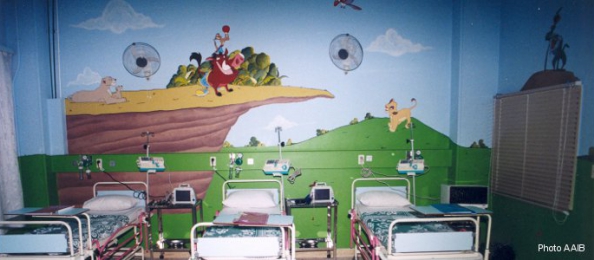Sustaining Finance and Financing Sustainability in the Middle East
Arab African International Bank (AAIB) believes in the significance of conserving the global environment for future generations and realizes the major role it has to play regarding this increasingly important issue. AAIB was the first bank in Egypt and the second in the region to adopt the Equator Principles to appraise projects’ financing while taking into consideration the social, ethical, and environmental hazards.
The pledge is derived from the AAIB belief in broadening the scope of risk to go beyond credit risk to include social and environmental risk. AAIB constantly finds ways to minimize resource use to better sustain the earth, which has taken place through the following measures:
Expenses Committee:
Launched in February 2009, the Expenses Committee has a mission to improve the banks cost structure and operating targets while replacing the “culture of excess” with the “culture of necessity.”
E-Movement:
In 2008, AAIB had an internal initiative for replacing monthly salary pay slips with e-Statements. Issuing pay slips electronically has many benefits. It reduces time pressures, reduces paper consumption, and allows employees to easily view their salaries for any pay period they wish, rather than being limited to a one-month statement.
Environmental Conservation: AAIB goes beyond Finance
From guidance to practice: AAIB taking responsibility
In 2004 AAIB announced its adoption of the United Nations Global Compact’s Ten Principles, making AAIB one of the pioneering financial institutions in the Egyptian market to become a signatory. This step was taken to align business practices with the sustainability measures of the Ten Principles promoting human rights, labor standards, anti-corruption, and the environment. Since then, AAIB has annually issued its Communication of Progress, which explains the organization’s practices according to the Principles. Central to AAIB’s philosophy is environmental preservation. The bank is collaborating with national and global partners as part of its corporate social responsibility (CSR) strategy. The bank has shown a great commitment to the UN Global Compact through its involvement in the ECRC (Egyptian Corporate Responsibility Council) with the UN Local Network in Egypt, which aims at offering support, guidance, and assistance from the UN for the Global Compact participants in Egypt.
AAIB is an Equator Bank
In 2009, AAIB decided that CSR should go beyond the general corporate practices and charity principles to include assessment for investment standards that require financing of more than $10 million. Thereafter, AAIB joined the Equator Principles, which are a voluntary set of standards for determining, assessing, and managing social and environmental risk in project financing. AAIB has taken this step forward in the belief that sustainability of business practices is directly proportional with the sustainability of available resources.
Facts
The core business of AAIB is engaging its stakeholders and reflecting the transparency of its practices. AAIB published its first sustainability report, entitled Finance with Value Creation, in December 2010, marking the first sustainability report to be issued by a corporate bank in Egypt.
As part of its “policy advocacy,” AAIB shares its social and environmental risk-initiative with peers and other corporate banks in Egypt and the Middle East. In cooperation with the International Finance Corporation, AAIB has conducted a workshop for heads of functions, managers, and branch managers on social and environmental risk policies. In 2011 AAIB launched the CSR Awareness Campaign as a core component of its Product Awareness program for staff.
From business impact … to community impact
AAIB has made visible efforts to measure the business and community impacts of its spending scheme in an attempt to assess the impacts of the bank’s activities on the community. AAIB adopted the London Benchmarking Group in 2006, and in 2009 the CSR Unit submitted the first London Benchmarking Group report, which measures AAIB’s Corporate Community Investment (CCI). The report represents AAIB’s impact on the community with numbers and diagrams. The report includes the “We Owe It To Egypt” (WOITE) spending scheme; sponsorships; philanthropy and donations; in-kind contributions; and employees’ volunteer hours.
Health and Education: Two main pillars that limp and hobble

In 2007, AAIB has institutionalized its socially responsible practices within a foundation, namely the We Owe it To Egypt Foundation, with an objective of turning Egypt’s public sector hospitals into centers of excellence with world-class service. Two sectors are of a concern to the foundation: Health and Education.
What is special about WOITE?
It is the “cross-sector cooperation” between health, education, and financial institutions. The Foundation is not an emblematic grant-giving foundation but an operational foundation with hands-on involvement in its projects. The approach adopted by the bank involves more than just material donations, and attends to details of the renovation process of projects.
The Foundation is responsible for providing ongoing training and skills upgrade opportunities for medical staff and improving service delivery. The Foundation provided a major grant to upgrade the information technology system of these unique centers of excellence in Egypt to maintain their excellence as renowned educational and medical centers.
This has taken place through the following projects:
- Cairo University Specialized Pediatrics Hospital (CUSPH)
This hospital is dedicated to providing medical services for children aged up to eight years old. This is the only hospital in the district that specializes in treating infants and children, hence, it faces the pressure of serving the population of a colossal district. - The National Cancer Institute (NCI)
This project is the real challenge for AAIB. In Egypt, more than 90 percent of cancer patients cannot afford treatment costs. There has been a steady increase in cancer patients. The Foundation is in charge of supplying the state-of-the-art equipment and doubling the capacity of the operating rooms and the ICU, thus cutting down on waiting lists. - The Urology and Nephrology Center in Mansoura University
This center provides not only world-class treatment to its patients, but also commands a research and academic center that helps in providing thousands of educational opportunities to Egypt’s doctors and scientists.
AAIB Award: Young minds … great ideas
The first of its kind in the field of academia, the AAIB Award encourages university undergraduates to design innovative financial products or services for the Egyptian market. The annual competition aims at bridging the gap between academic and professional life. The Award was launched in 2003, targeting only one university. In 2008 the scope expanded to include seven more universities across Egypt’s governorates.
Incorporated in 1964 as the first Arab multinational bank in Egypt, Arab African International Bank was established by a Special Law as a joint venture between the Central Bank of Egypt and Kuwait Investment Authority. Since its inception, AAIB has been known as one of the most distinguished commercial and investment banks in the region.
While maintaining its core competence as a corporate bank, AAIB is making break throughs in retail activities through expanding its innovative product range and geographic presence in the most commercially strategic locations. One of the fastest growing banks in Egypt, AAIB is gaining significant momentum towards assuming a leading position among Egyptian banks.
AAIB's products and services are designed to meet the evolving needs of corporate clients, their employees and selected high net worth individuals.
About Us // Privacy Policy // Copyright Information // Legal Disclaimer // Contact
Copyright © 2012-2018 macondo publishing GmbH. All rights reserved.
The CSR Academy is an independent learning platform of the macondo publishing group.









